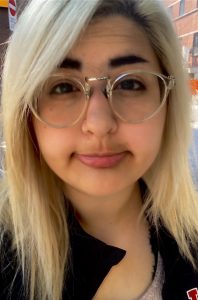OXFORD, Miss. – A University of Mississippi graduate student in chemistry has been selected to present her research at a national conference as a recipient of the 2023 Women Chemists Committee Merck Research Award.
Christine Hamadani, a third-year doctoral student, is among eight individuals who will present during the fall American Chemical Society national meeting in August in San Francisco. The award winners will also present their research at a half-day symposium and be recognized at the awards symposium and the Women Chemists Committee luncheons.
“I was over the moon when I learned I was selected, and so honored when the award committee informed me I was selected from over a hundred applicants from across the country,” Hamadani said. “It feels incredible that innovative science is recognized and rewarded, especially when I am joining a cohort of top-tier scientists selected from schools like Yale and Northwestern.”

Christine Hamadani, a third-year doctoral student, is among the winners of a 2023 Women Chemists Committee Merck Research Award. Submitted photo
As part of the award involves being matched to a Merck scientist in a research area for career mentorship, Hamadani said the award is invaluable as she explores different career options after graduation.
“The pharmaceutical industry is one of them,” she said. “Merck is one of the largest pioneers in pharmaceutical innovation, so this gives me firsthand insight not only into what it’s like being a scientist in pharma, but also what it’s like working at Merck.”
Hamadani is a talented and driven researcher who has demonstrated a creative bent for scientific investigation with applications beyond pure academics, said Ryan Fortenberry, associate professor of chemistry and biochemistry and graduate student coordinator.
“Christine works tirelessly and has enhanced the research impact of our department,” he said. “By being granted this award in a cohort of students from typical research powerhouse universities like Yale, UNC-Chapel Hill, Michigan and Northwestern, Christine is showing that our students can compete with the very best.
“She is raising the status of our department and exemplifying how our students are among the most promising young researchers in the country.”
Hamadani’s research focuses on nanomaterials chemistry and engineering for biological systems. At the ACS meeting, she will be presenting work specifically on bioengineering linear-dendritic block copolymers, or LDBCs, for next-generation drug delivery in the bloodstream.
LDBCs are new polymeric materials that can be made into nanoparticles with the ability to efficiently carry cancer drugs and imaging agents. However, their instability and toxicity to blood cells restricts their applicability for intravenous injection.
“In the Tanner lab, we make ionic liquids out of natural ingredients that are biocompatible with the body and can give materials and molecules new biological properties for drug delivery applications,” she said. “My project involved formulating LDBCs with an IL called choline 2-hexenoate.
“This IL makes polymers stable, safe for the human body and guides them to target organs by hitching a ride on red blood cells.”
Throughout the rest of her doctoral work, Hamadani is interested in furthering the IL-nanoparticle platform that she developed over her graduate research as close as possible to clinical trials.
“We’ve already done mice and rats with pretty good success, so I’m excited to potentially get to work with larger animals and, hopefully, cure disease models,” she said.
Hamadani hopes to one day lead a team of R&D scientists to create translatable and accessible therapeutic solutions for people of color and those with low socioeconomic status who suffer from blood disorders.
“This is an issue that hits close to home for me, as I myself suffer from a blood disorder which has no current safe and permanent solution,” she said. “So long-term, I want to work to advance knowledge from a new innovative perspective to help cure that disease. I may even use knowledge from this technology one day.”